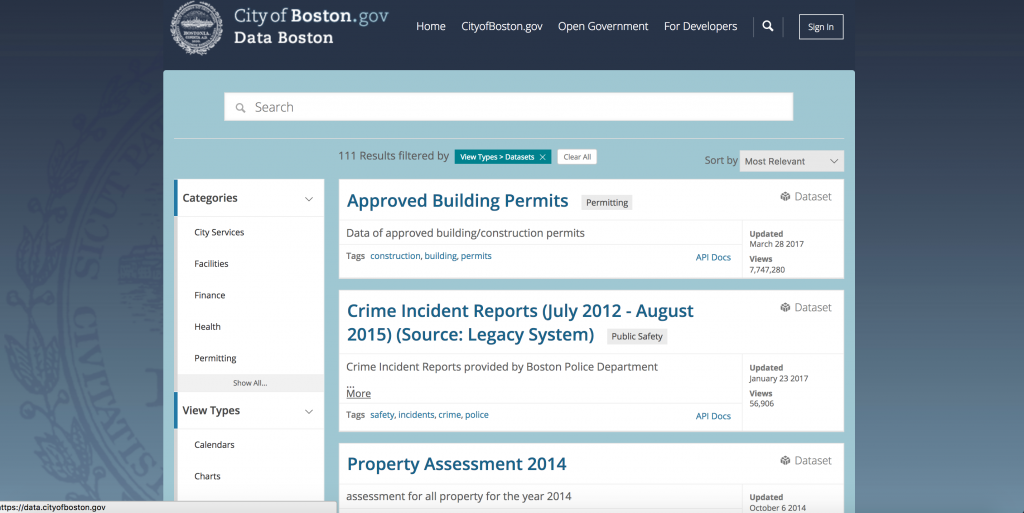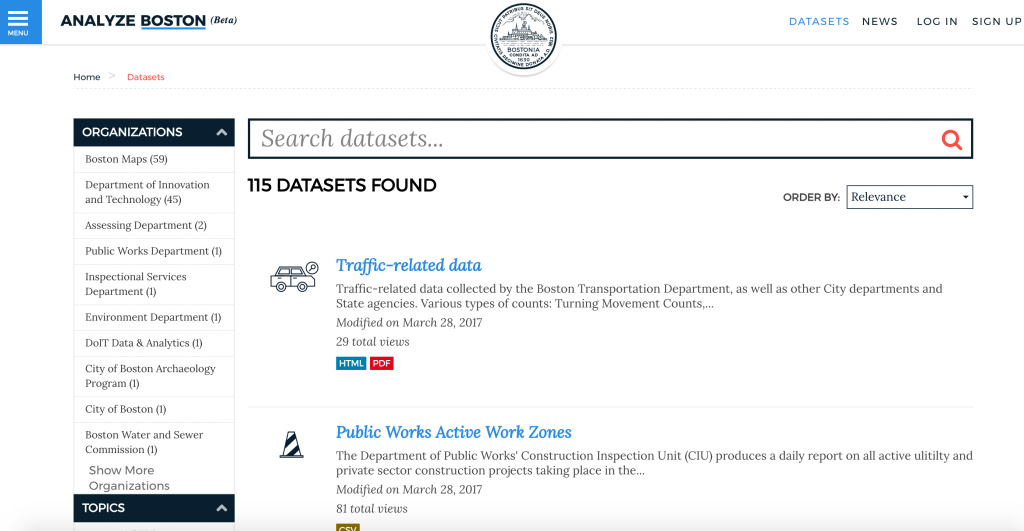
Boston’s new and improved open data hub, dubbed Analyze Boston, will go live April 6. Need to find facts, figures, or maps related to the area of Boston you live in? Analyze Boston is your newest civic tech tool for that and more. The City of Boston decided that its existing open data portal needed a major revamp. The new version was launched in beta in late February to spark conversation and get feedback before the site’s official release.
What’s the difference?
First and foremost, usability. The teams behind it, the Analytics Team & DoIT Boston, with the help of CKAN & OpenGov Open Data, put a major emphasis on user experience and user engagement as it relates to data. As a result, the data is easily searchable and paired with much needed descriptive information to make the datasets more intuitive.
“That’s the goal with this new platform — making sure it’s both used and user-friendly,” said Howard Lim, the product manager for Analyze Boston.
With plain language and vivid imagery, the city’s new online presence aims to engage a broad audience from all corners of Boston to understand the various ways government enhances lives and provides services.
“We’re purposely calling this Analyze Boston because we think those plain words might make data a little more interesting to a broader audience regardless of someone’s technology background,” Lim said.
The goal is to build knowledge around public data, he said. This time around, the datasets on the new portal will all be under a public domain license. That way, both residents and internal stakeholders can use the data how they see fit and perhaps bring critical solutions and civic tech tools to urban challenges. Application developers will be able to access and integrate datasets through robust APIs. Other users will be able to search the datasets through flexible search tools. And on the new mobile-friendly platform, users are met where they’re already at.
“Eighty percent of the world has a smart phone. Maybe people can search open data sets on the T, and say, “oh, I found something that’s interesting,” and then get back home to work and plug away at it,” Lim said.
The new data hub currently has about 115 data sets available, from CityScore, food establishment inspections, rainfall data, public safety data and more. Lim said more data sets are to come, and they’ll be constantly updated.
“Realistically, there will always be more data and knowledge to build, and we have to continue to be amenable to what the people want to see, so our work will continue,” he said.

Why is access to open data important?
It’s worthwhile to be proactive in the sharing of information, Lim explained, and if cities like Boston can lead the way in transparency, other cities might be keen to follow. Boston residents will be able to see how city government works and that their tax dollars are being used in a respectful and responsible manner to better the spaces we live, work and play in.
As the growing digital catalog of information for the city’s institutions that publish data, Analyze Boston helps citizens visualize their lives.
“This digital catalog is very valuable because it allows people to see that information does indeed exist, all in one place, without having to comb through various web sources to find what they’re looking for,” Lim said.
Since the beginning of Mayor Marty Walsh’s administration, he, along with the city’s innovation team, the Mayor’s Office of New Urban Mechanics, has emphasized the importance of open data. Last year, the city launched the Open Data to Open Knowledge initiative, and Mayor Walsh has encouraged city agencies to publish data online for public consumption. In May 2016, Boston appointed Andrew Therriault as its first Chief Data Officer.
“Our goal in creating the Analyze Boston platform is to better fulfill the promise of open data and open government, by seeing open data not just as a collection of datasets but as a platform for sharing knowledge,” Therriault said in a press release.
April 6 marks the start of a month-long Analyze Boston Open Data challenge. Interested candidates are encouraged to share analyses, visualizations, models and applications incorporating data from Analyze Boston. The challenge culminates with a showcase and prizes on May 6 at District Hall.


